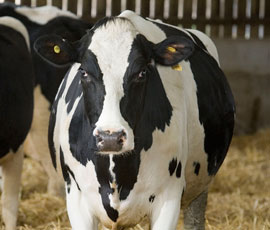Dairy debate: Is intensification the answer?

Whether or not to intensify is a question many dairy producers ask themselves. Gemma Mackenzie speaks to two producers with completely different systems.
The more milk, the better
Milking and managing a herd in the top 1% for milk production, Stephen Bendall is a firm believer in intensification. He openly admits he gets a “buzz” from getting more milk from his cows, and argues that increased yields are just a case of unlocking a cow’s genetic potential.
“We have always tried to be at the higher end of the dairy business, and because we are tenant farmers, the push is there for us to pay the rent,” he says.
So does he think intensification is the answer for the UK dairy industry?
“I think the UK dairy industry will become very diverse, and I think the system will depend on the milk buyer. For us, because we are calving all year round and trying to maintain yields, we have gone down the intensive route,” says Mr Bendall.
“I have a personal motivation to get high yields from these cows and I’m really interested in their nutrition and genetics. We are in the top 1% of milk yield potential and get a plus on the milk side of 500kg, so in a way I believe if we put these cows in a low-yielding situation, we would actually be holding them back.”
Farm details: New Farm, Markesbury, Bath
125 Holstein cows are milked on two robots, on a zero-grazing system. The cows currently yield on average 40 litres a day, and are on track to average 12,000 litres a year.
Longevity is more important than high yields
Although Mat Boley isn’t against intensification per se, to him dairy production is about giving cows a long and happy life, rather than producing vast amounts of milk.
He argues that the UK dairy industry should advantage itself by growing and utilising large amounts of “very economically grown pasture” and says more producers could be making more from this.
“There are lots of high-yielding dairy farmers who are great managers, but their cows will never live as long as mine do. We are trying to give ourselves and the cows as easy a life as possible – If I was a cow I’d want to live for as long as possible,” he says.
So does he think intensification is the answer for the UK dairy industry?
“Intensification for me is more milk production for every cow; I don’t have a problem with this so long as you are not compromising the cow’s lifespan,” says Mr Boley.
“I don’t think the industry will change – it will be mostly made up of intensive dairy farmers – but I do think more people will be keen to learn how to get more grazed grass into the diet of the cows.”
Farm details: Batch End Farm, Lympsham, Somerset
360 Jersey crossbred cows milked once a day, on a 100% grazing system. The cows currently yield on average 3,000 litres a cow a year, supplying organic milk to a local cheesery.
Twitter comments #dairydebate
@GlenappCharlie Optimisation of farm for sustainable business development does not always mean intensification
@Ardwall_farm No brainer. More people to feed, same land area so need to intensify, also need GM food and more research to aquaculture
@Farming_Gareth For those of us not lucky enough to have nice dry ground, it’s the only answer! 1-4 month grazing system not profitable
@sandpark_rob Not necessarily, it has to suit your farm, set up, lifestyle and mindset. Efficiency is the answer
@Rob__Hitch Intensification being driven by costs, a cow and a shed cost about 1/3 of an acre of land, and much easier to acquire
@neil_niggsy There’s a limit for us. Do we need to keep chasing our own tails and for what? The supermarkets to get food cheaper. Us, become more efficient, improve standards of welfare for animals and ourselves but still acquire land with sense in mind
@DairyDayment Depends what the Qu’ is. If it’s how to make money then it’s turn sunshine into grass into milksolids + keep it simple.
@cocklepark I think the current dairy industry is structured to encourage larger and more intensive units. With the exception of organic premia, I don’t know of any bonus paid to smaller extensive units
Luke Anthony It’s not necessarily the answer, but definitely a solution for some producers. But I feel that with an ever-building pressure on carbon footprints that grass-based dairying, not necessarily extreme, will still be the backbone of British dairying.
Simon Robert Cornforth Intensification was becoming the answer, but there seems to be less pressure to do it with the milk price rises in the last year.
Next month we’ll be asking: Should UK milk be aimed outside the domestic market? Join the debate on Twitter #dairydebate
• Join in the discussion on our website forum
